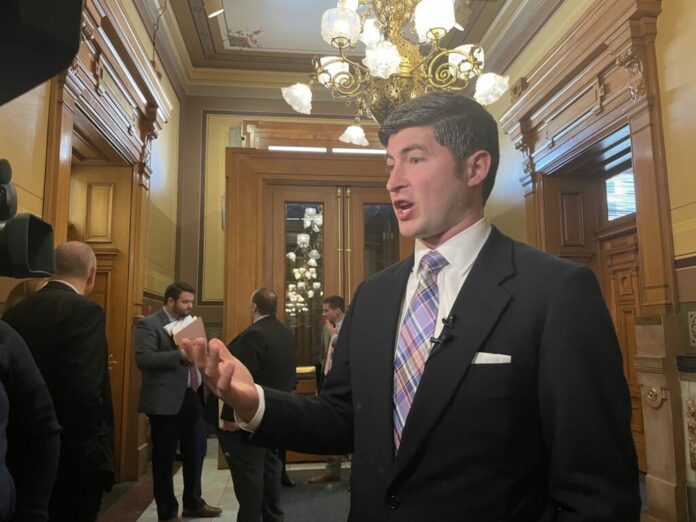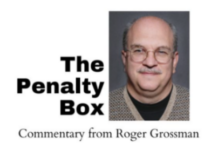By Leslie Bonilla Muñiz
Indiana Capital Chronicle
INDIANAPOLIS — A bill bringing voter identification requirements to mail-in ballot applications got plenty of flak on Monday for provisions opponents said would disenfranchise elderly and disabled voters while also needlessly complicating procedures for election employees.
But the bill’s author — Rep. Tim Wesco, R-Osceola — and supporters say the measure would add more security to Indiana’s elections than signature verification alone can provide.
“House Bill 1334 would finally bring absentee voting by mail up to par with voting absentee in person or voting on Election Day in person,” Wesco told the Senate Elections Committee Monday. The bill passed out of the House last month on a party-line vote.
Committee Chair Jon Ford, R-Terre Haute, said at the top of Monday’s hearing that he would hold the bill while Wesco worked on amendments.
Julia Vaughn, who leads nonpartisan elections watchdog Common Cause Indiana, argued the bill was unnecessary.
“It’s a bill that is out of balance. It’s a bill that over-emphasizes concerns about the security of voting by mail at the expense of easy access for voters and smooth administration by county election officials,” Vaughn told lawmakers. “And it does so with little to no proof that such restrictions are necessary from a security perspective.”
Expanding voter ID laws
Right now, voters requesting absentee ballots are asked — but not required — to provide the last four digits of their Social Security Numbers on their applications. That applies to mail-in ballot applications, as well as applications for traveling board, military-overseas and other others.
House Bill 1334 would make identification mandatory, and more.
It would require a voter to put down those last four numbers, or one of three other identifiers: an Indiana driver’s license number, a non-driver identification card number or a unique identifier for those who registered to vote decades ago.
A voter could instead include a photocopy of their license, non-driver card or other proof of identification — like a passport or state university-issued ID card — in the envelope with the application.
County election boards would have to match at least one of the numbers with information in the voter’s registration record. Without a match, election officials would have to work with the voter to resolve the errors, delaying receipt of the mail-in ballot.
The completed ballot needs to be back in officials’ hands by 6 p.m. on Election Day to get counted.
The bill would also bar state agencies and local units of government from “mass-mailing” unsolicited applications. And it would give the Secretary of State — currently Diego Morales — broad powers to “prescribe any other procedures necessary to implement” certain provisions dealing with how to get new applications to and from voters.
Indiana Election Division Co-Director Brad King, who spoke on behalf of himself and Morales, said the legislation was a priority for Morales’ office. He said the measure would shore up voter confidence in the system’s safeguards.
But King’s Democrat counterpart, alongside voting rights advocates, argued the bill would cause more harm than good.
Cost-benefit analysis
The majority of those who spoke Monday did so in opposition to the bill.
Voting rights advocates worried the bill’s new requirements could block eligible Hoosiers from voting if any mismatches aren’t corrected by state deadlines.
Ami Ghandi of the Chicago Lawyers Committee for Civil Rights — which also covers Indiana — suggested the voter ID provisions could violate the Civil Rights Act, or even infringe on federal constitutional rights to vote.
Others, including Democrat lawmakers, drew attention to the photocopy provision, arguing it could be considered an illegal “poll tax” because not every Hoosier has a photocopy machine or can purchase access to one.
King, the Republican IED co-director, rejected that. The U.S. Supreme Court, in upholding Indiana’s first photo ID law, ruled that identification requirements aren’t poll taxes, he said.
Democrat Co-Director Angela Nussmeyer said the bill’s processes for both checking and fixing applications — which it assigns to partisan county clerks — duplicates processes already carried out by bipartisan county election boards.
“I do not see an advantage to additional [steps],” agreed Monroe County Clerk Nicole Brown, in response to questioning from a GOP lawmaker. She spoke on behalf of the state’s county clerks association, which is neutral.
Nussmeyer also said that limiting application requests to Hoosiers themselves or select family members would block nursing homes and others from requesting applications for their seniors.
Amendments and a vote to come
The bill’s seen plenty of change already, and is expected to get some more tweaks.
The original version had a provision vastly limiting who could vote by mail, but lawmakers ditched that in an initial House committee meeting.
After criticism from elections experts and voting rights advocates, Wesco also cut a clause banning highlighter marks on applications and broadened a provision that could’ve blocked election officials from sending applications to multiple people in the same household.
Wesco’s working on additional changes.
He told reporters Monday that he was considering language to let Hoosiers email or fax in photographs of their identifications, use completed applications to update voters’ files, and ensure that implementation would match his intentions.
“We want to make sure that we get this right,” Wesco told senators. “We don’t want to create problems and create headaches. We want to make sure we do it right.”
* * *
The Indiana Capital Chronicle is an independent, nonprofit news organization dedicated to giving Hoosiers a comprehensive look inside state government, policy and elections. The site combines daily coverage with in-depth scrutiny, political awareness and insightful commentary.
You can read the original version of the story here.





